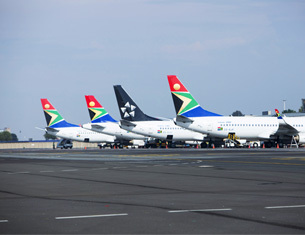Boeing, South African Airways (SAA) and low-cost carrier Mango have carried out Africa's first passenger flights with sustainable aviation biofuel.
The SAA and Mango flights carried 300 passengers from Johannesburg to Cape Town on Boeing 737-800s using a blend of 30 % aviation biofuel produced from Sunchem's nicotine-free tobacco plant Solaris, refined by AltAir Fuels and supplied by SkyNRG.
In 2013, Boeing and SAA launched their sustainable aviation fuels collaboration and in 2014, Project Solaris became the first focus project that converted oil from the Solaris plant seed into bio-jet fuel.
In 2015, farms in Limpopo Province of South Africa, from which the biofuel for the flights was sourced, achieved certification from the Roundtable on Sustainable Biomaterials (RSB). RSB certification provides a model for expansion of Project Solaris to larger-scale production. The initiative also focuses on South Africa's goals for public health, rural development and economic and employment opportunities for farmers by increasing production of Solaris and other feedstocks on under-utilized land.
The partners have also launched a stakeholder and sustainability plan called the Southern Africa Sustainable Fuel Initiative (SASFI) to ensure a long-term domestic fuel supply for SAA and other regional fuel users. The goal is to scale-up over the next several years to gain additional biofuel capacity.
Studies have shown that sustainably produced aviation biofuel emits 50-80% lower carbon emissions through its life cycle that fossil jet fuel. Airlines around the world have conducted more than 2,500 passenger flights using various forms of aviation biofuel since it was approved for commercial use in 2011.

